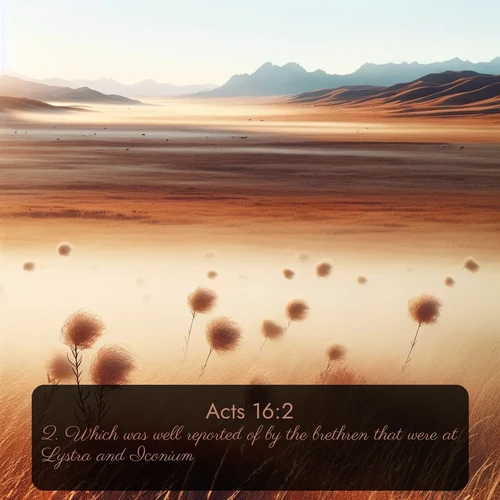Acts 16:2 plusieurs versions / traductions
English Bible Translations
German Bible Translations
2. Der hatte ein gut Gerücht bei den Brüdern unter den Lystranern und zu Ikonion.
2. Der hatte ein gutes Zeugnis von den Brüdern in Lystra und Ikonium.
French Bible Translations
2. lequel avait un bon témoignage des frères qui étaient à Lystre et à Iconium.
Versions with Strong Codes
Acts 16 / KJV_Strong2. Which[G3739] was well reported of[G3140] by[G5259] the[G3588] brethren[G80] that were at[G1722] Lystra[G3082] and[G2532] Iconium.[G2430]
Strong Code definitions
G3739 hos/hos, including feminine ho ho probably a primary word (or perhaps a form of the article 3588); the relatively (sometimes demonstrative) pronoun, who, which, what, that:-one, (an-, the) other, some, that, what, which, who(m, -se), etc. See also 3757. see G3588 see G3757
G3140 martureo/mar-too-reh'-o from G3144; to be a witness, i.e. testify (literally or figuratively):--charge, give (evidence), bear record, have (obtain, of) good (honest) report, be well reported of, testify, give (have) testimony, (be, bear, give, obtain) witness. see G3144
G5259 hupo/hoop-o' a primary preposition; under, i.e. (with the genitive case) of place (beneath), or with verbs (the agency or means, through); (with the accusative case) of place (whither (underneath) or where (below) or time (when (at)):--among, by, from, in, of, under, with. In the comparative, it retains the same general applications, especially of inferior position or condition, and specially, covertly or moderately.
G3588 ho/ho, including the feminine to to in all their inflections; the definite article; the (sometimes to be supplied, at others omitted, in English idiom):--the, this, that, one, he, she, it, etc.
G80 adephos/ad-el-fos' from G1 (as a connective particle) and delphus (the womb); a brother (literally or figuratively) near or remote (much like 1):--brother. see G1&volume=KJV_strong' target='_self' >G1 see G1&volume=KJV_strong' target='_self' >G1
G1722 en/en a primary preposition denoting (fixed) position (in place, time or state), and (by implication) instrumentality (medially or constructively), i.e. a relation of rest (intermediate between 1519 and 1537); "in," at, (up-)on, by, etc.:-about, after, against, + almost, X altogether, among, X as, at, before, between, (here-)by (+ all means), for (... sake of), + give self wholly to, (here-)in(-to, -wardly), X mightily, (because) of, (up-)on, (open-)ly, X outwardly, one, X quickly, X shortly, (speedi-)ly, X that, X there(-in, -on), through(-out), (un-)to(-ward), under, when, where(with), while, with(-in). Often used in compounds, with substantially the same import; rarely with verbs of motion, and then not to indicate direction, except (elliptically) by a separate (and different) preposition. see G1519 see G1537
G3082 Lustra/loos'-trah of uncertain origin; Lystra, a place in Asia Minor:--Lystra.
G2532 kai/kahee apparently, a primary particle, having a copulative and sometimes also a cumulative force; and, also, even, so then, too, etc.; often used in connection (or composition) with other particles or small words:--and, also, both, but, even, for, if, or, so, that, then, therefore, when, yet.
G2430 Ikonion/ee-kon'-ee-on perhaps from G1504; image-like; Iconium, a place in Asia Minor:-Iconium. see G1504
Prédications qui analysent les thèmes Actes 16
Thèmes : L'Évangile en Macédoine; Paul à Philippes; Miracle de la servante; Emprisonnement de Paul; Libération de Paul; Conversion du geôlierActes #19: Le disciple n’est pas plus grand que le maître.
Related Sermons discussing Acts 16
Themes : L'Évangile en Macédoine; Paul à Philippes; Miracle de la servante; Emprisonnement de Paul; Libération de Paul; Conversion du geôlierActs #19: The disciple is not greater than the master (Acts 15-16)
see also: Bible Key Verses ; KJV Bible Images, BBE Bible images

